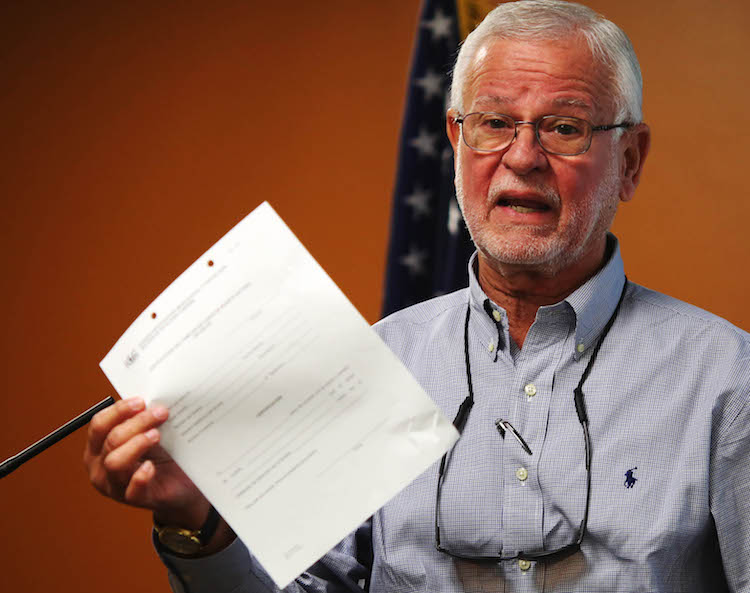On Tuesday, Puerto Rico governor Ricardo Rosselló convened government officials and community leaders for a summit in San Juan to discuss crime on the island, noting that the end result would not be an “overnight home run.”
https://www.facebook.com/rrossello/videos/340103173255288/
“We’re not going to come out of here with all the solutions,” Rosselló said. But it did seem that he was willing to confront the problem with a more humane approach (a Mano Amiga?) and not the Mano Dura, or Iron Fist, visited on Puerto Rico in the early 1990’s by his father, then governor Pedro Rosselló, to less than stellar results.
https://www.facebook.com/rrossello/videos/349490615888249/
The summit began with gripping testimony from Aníbal Santana Merced, an ex-convict who spoke about what drove him as a young man to choose a life of crime. He stated the obvious: that crime is a direct result of inequality and poverty.
“I do not remember reading anywhere that a child is born a criminal. That is not real,” Santana Merced said.
“In every path of a life, there is a story, and it is what happens in those lives that we only know through the news and in the newspapers, now also on social media, and that is how we come to know about this delinquent, the one they are showing us. But we do not know what led that person to commit a crime. There is always a process. There is always a cause,” he added.
https://www.facebook.com/rrossello/videos/2276274765982598/
“We are gambling with our lives,” Senator Vargas Vidot, a doctor and philanthropist who has spent years working on drug rehabilitation on the island, said.
“We need to recognize our reality from the lips of those that build it. There are community workers here that every day live that reality in their face. They are not just sitting at a desk. We have police here, that every day risk their life and they are not just sitting at a desk,” he said.
Vargas Vidot then threw a gauntlet down—urging political leaders to stop their partisan bickering and work in unison.
“We have to let go of the silliness that we have validated as respectable issues, and we need to start listening to the street, to listen to the people, listen to their pain,” he said.
Pivotal Moment or More of the Same?
Yet no one is holding their breath for a dramatic change. They see this latest gathering for what it is: yet another summit of smoke and mirrors that is great for television, Washington and foreign investors.
“Same shit. They know the root causes of these problems and the solutions, but they also know that these solutions will create problems come election time with the religious right and the status of the obedience demanded by the Americans and the desire for a permanent union,” said Rafael Antonio Ruiz-Ayala, a Puerto Rican lawyer.
“They will just have another round table to argue and decide generalities and do nothing that will really change things,” he said.
The summit was prompted by a litany of grainy phone videos of armed young men running out of SUV’s, sharp bursts from modified Glocks and AK-47s blitzing their target, as the sound of gun fire is accompanied by the bewildered voices of those recording on their phones, videos immortalized now on social media.
For the past three weeks, there have been two hot topics of conversation in Puerto Rico: Lin Manuel Miranda’s mega-hit musical “Hamilton” and these videos, which, contrary to “Hamilton,” almost everyone on the island and the diaspora has seen.
If you happened to see a recent the report by CBS correspondent David Begnaud, who made a name for himself covering the aftermath of Hurricane María in Puerto Rico in 2017, on this new rash of shootings, you would think he was in Honduras or Afghanistan under intense shelling, not doing a live segment from one of the most exclusive beach resorts on the island.
“This is not a war zone,” he said, in his best Orson Welles. “It is San Juan, Puerto Rico last Sunday.”
Let’s get one thing clear. At the Dorado Beach Resort Hotel, clear and present danger comes in the form of beaky little black birds that steal food from your plate at the open air buffet.
Anchor Gail King ends the report by stating: “That is a very grim picture you painted, David.”
Grim indeed. The problem is—it is not entirely true. And sensationalist reports like these are what exacerbate the issue and prompted summits such as the one today.
The numbers just don’t add up to a brazen crime wave. As a recent New York Times story notes, “Puerto Rico recorded 641 murders in 2018, down 10 percent from 710 the year before. For comparison, the island set a record of 1,135 homicides in 2011—30 killings for every 100,000 residents.”
There have been 43 reported killings on the island in the first few weeks of 2019, compared with 65 during the same period in 2018.
“In reality, things are level. The official numbers have not indicated a rise in crime. Now, with all these bloody cellphones every one records, and the situation looks worse,” Yadira Delgado, a Puerto Rican veteran journalist, said.
Héctor Pesquera, the public safety secretary, claimed that the highly publicized visuals, as he put it, masked the progress being made.


Héctor Pesquera, Secretary of Public Security, in 2017. (Photo by the Center for Investigative Journalism)
This does not put food on the table for the nearly 5,000 police officers who have quit in the past few years. In 2012, the island had 17,500 police officers. It now has 11,800, according to the public safety department. About 900 officers resigned last year, and this number does not include those who retired. Those that are left are close to mutiny and have called for Pesquera to resign.
Hurricane María made matters worse. The devastation, which killed almost 3,000 people, caused a mass exodus of an estimated 200,000 Puerto Ricans from the island and laid bare a weak infrastructure—one just another storm away from collapsing completely. A deeply inadequate federal response has done little to assuage the damage.
Even before María, however, Puerto Rico buckled under the pressure to restructure its $70 billion bond debt and $53 billion in unfunded pensions for government employees.
To satisfy the bond holders, a bipartisan Washington imposed a Financial Oversight and Management Board, an unelected body that has rolled out a draconian debt restructuring plan that imposed harsh austerity measures on the island. One of these measures has been to shave 25 million from the police force.
Yet, unwittingly and behind the sensationalism, the CBS report did illustrate what is at the core of the violence in Puerto Rico: economic and social inequality.
“In Puerto Rico, what is normal, and it is a tragic normality, but it is the normality none the less, is that there are 15 to 16 murders per 100,000 people, and that is what we are seeing now. That is to say, between two and three murders a day,” said Gary Gutiérrez, Puerto Rican criminologist and veteran journalist.
“Violence in Puerto Rico throughout the 20th and 21st centuries has been a violence that is cyclical. Contrary to other parts of the Caribbean, where violence is always linear, we have seen peak periods and periods where the incidence of violence goes down. When one looks at the statistics, you can see that the levels of unemployment are very similar to the levels of the incidence of violence,” he added.
The Politics of It All
So where does this go next?
“There are some very short-term solutions, or short-term steps and long-term steps, education and legalizing some of the drugs, is something that has to be looked at as definitely long term, and something that we need to work on,” said Senator Eduardo Bhatia, who recently announced he will run for governor under the opposition Popular Democratic Party.
“But short term, there is the morale at the police is at an all-time low. We can love Mr. Pesquera, or we can hate him, but the thing is that he is having a mutiny on board. Policemen are all jumping ship right now. There is a leadership problem, and again, I do not want to demonize Mr. Pesquera, but I think he has a problem there. He has a huge leadership problem in his department right now.”
“People are scared to death,” said Bhatia. “If the levels of anxiety of our people on criminal issues determine whether there is a crisis, then we do have a crisis, because people are very anxious right now,” he said.
“It’s a problem, but the ports of entry are controlled by the United States government, supposedly the most professional group to deal with that, no?” Bhatia added.
And he agrees that the onslaught to what are already debilitated institutions will only make the problem worse.
Puerto Rico’s relationship with the United States has become, as Maya Angelou wrote, “the rust on the razor that threatens the throat.”
Something must be done. But it is clear that these summits are really not the solution.
***





Y las babosideds, las estupideces y las pendejaces politicas siguen como siempre pero ningunos llegan tarde a los “Wine & Cheese” tertulias en Palmas del Mar…que necios siguen siendo…que bochornos son!
Al wine and cheese en Palmas del Mar. Como me ha gustado eso!